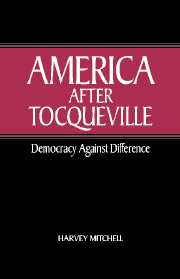Book contents
- Frontmatter
- Contents
- References to Tocqueville's Democracy in America
- Preface
- I PATHS TO DEMOCRACY IN AMERICA
- II BEGINNINGS AND DEMOCRACY
- 4 Beginnings and History: Red and White in Tocqueville's America
- 5 The New England Township Before the Revolution: Tocqueville's American Pastoral
- 6 A Second Beginning: Black and White in Tocqueville's America
- III AMERICAN DEMOCRACY ON TRIAL
- 10 Conclusion
- Works Cited
- Index
4 - Beginnings and History: Red and White in Tocqueville's America
Published online by Cambridge University Press: 10 August 2009
- Frontmatter
- Contents
- References to Tocqueville's Democracy in America
- Preface
- I PATHS TO DEMOCRACY IN AMERICA
- II BEGINNINGS AND DEMOCRACY
- 4 Beginnings and History: Red and White in Tocqueville's America
- 5 The New England Township Before the Revolution: Tocqueville's American Pastoral
- 6 A Second Beginning: Black and White in Tocqueville's America
- III AMERICAN DEMOCRACY ON TRIAL
- 10 Conclusion
- Works Cited
- Index
Summary
In looking at the past, Tocqueville always coupled and contrasted beginnings with endings. The demise of the ancien régime, the attempts to restructure society and politics after 1789, but especially the Jacobinization of, or overwhelming concentration on, politics, loomed over his analysis of what was coming to an end and what was awaiting birth. These metaphors of closures and beginnings are to be found in Democracy in America; in his 1836 sketch for, and his uncompleted study of, L'Ancien Régime et la Révolution; and in his references to and recollections of a society of ranks, castes, elitism, and a bureaucracy, which were only weakly, if at all, checked by the quasi-juridical, quasi-legislative parlements. They carry with them the odors of tradition and the perfumes of a future. When Tocqueville was still an aspiring young magistrate in 1829, he looked back to the vertiginous past of the Revolution. Defending his client, he questioned the argument that the time had come to call for a moratorium on the Revolution — on the quest for liberty itself — on the grounds that the state, as the embodiment of stability, had interests more sacred than those belonging to the individual citizen. He wanted, to be sure, to see the Revolution brought to an end, not only as a concept but as a tradition that legitimated periodic challenges to authority that detracted from the need to concentrate on practical policy decisions.
- Type
- Chapter
- Information
- America after TocquevilleDemocracy against Difference, pp. 75 - 113Publisher: Cambridge University PressPrint publication year: 2002
- 1
- Cited by



